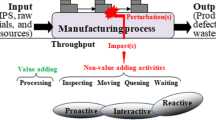Abstract
Research studies on multi-agent systems have been recently boosted by manufacturing and logistics with deep motivations like the presence of independent human deciders with individual goals, the aspiration to dominate the complexity of decision-making in large organizations, the simplicity and robustness of self-reacting distributed systems. After a survey of the multi-agent paradigm and its applications, the paper introduces the notion of hybrid holonic system to study the effect of supervision on a system whose elements negotiate and cooperate in a rule-settled environment to obtain resources for system operation. The supervisor can spur or disincentive agents by assigning/denying resources to them. A simple single-decider optimization model referred to a real application is described, and solution methodologies for optimal resource allocation fitting different scenarios (centralized, distributed, multi-agent) are discussed, identifying ranges of autonomy, quantifying rewarding and defining a negotiation protocol between the agents and the supervisor. Aim of the paper is to describe through an example a general methodology for quantitative decision-making in multi-agent organizations.
Similar content being viewed by others
References
Adacher, L., Agnetis, A. and Meloni, C. (1999) Autonomous agents architecture and algorithms in flexible manufacturing systems. Tech. Rep. 43–99, Dipartimento di Informatica e Automazione, Università di “Roma Tre”, Via della Vasca Navale 79, 00146, Rome, Italy.
Ahuja, R.K., Magnanti, T.L. and Orlin, J.B. (1993) Network Flows, Prentice Hall, Englewood Cliff, NJ.
Arbib, C., Ciaschetti, G. and Rossi, F. (1999) Distributing material flows in a manufacturing system with large product mix. Two models based on column generation. Lecture notes in Economics and Mathematical Systems. New Trends in Distribution. Logistics, Springer-Verlag, Berlin, pp. 235–253.
Balasubramanian, S. and Norrie, D. (1995) A multi-agent intelligent design system integrating manufacturing and shop-floor control, in Proceedings of the First International Conference on Multiagent Systems, pp. 3–19.
Boutilier, C., Shoham, Y. and Wellman, M.P. (1997) Economic principles of multi-agent systems. Artificial Intelligence, 94, 1–2.
Brafman, R.I. and Tennenholz, M. (1997) Modeling agents as qualitative decision makers. Artificial Intelligence, 94, (1–2), 217–269.
Chen, Z.L. and Powell, W.B. (1999) Solving parallel machine scheduling problems by column generation. INFORMS Journal on Computing, 11(1), 78–94.
Fischer, K., Muller, J.P., Pischel, M. and Schier, D. (1995) A model for cooperative transportation scheduling, in Proceedings of the First International Conference on Multiagent Systems, AAAI, San Francisco, CA. pp. 109–116.
Koestler, A. (1967) The Ghost in the Machine, Hutchinson and Co., London, UK.
Koller, D. and Pfeffer, A. (1997) Representations and solutions for game-theoretic problems. Artificial Intelligence, 94, (1–2), 167–217.
Kraus, S. (1997) Negotiation and cooperation in multi-agent environments. Artificial Intelligence, 94, (1–2), 79–99.
Lin, G.Y. and Solberg, J.J. (1992) Integrated shop floor control using autonomous agents, IIE Transactions, 24(3), 57–71.
Leung, J., Yang, X., Mak, R. and Lam, K. (1997) Optimal cyclic multi-host scheduling: a mixed integer programming approach, in Proceedings of the 5th Twente Workshop on Graphs and Combinatorial Optimization, University of Twente, Enschede, The Netherlands, pp. 170–175.
Lucertini, M., Nicolò , F. and Smriglio, S. (1999) Assignment and sequencing of parts by autonomous workstations. Tech. Rep. n. 364, Centro V. Volterra, Via della Ricerca Scientifica, 00133, Rome.
Malone, T.W., Fikes, R.E., Grant, K.R. and Howard, M.T. (1988) Enterprise: a market-like task schedule for distributed computing environments, in The Ecology of Computation, Huberman, B.A. (ed.), North-Holland, pp. 177–205.
Malone, T.W. and Smith, S.A. (1988) Modeling the performance of organizational structures. Operations Research 36, 3.
Nemhauser, G.L., Rinooy-Kan, A.H.G. and Todd, M.J. (1989) Optimization, North Holland, Amsterdam, pp 421–436.
Poole, D. (1997) The independent choice logic for modeling multiple agents under uncertainty. Artificial Intelligence, 94, (1–2), 139–167.
Ramos, C. and Sousa, P. (1996) Scheduling orders in manufacturing systems using a holonic approach, in Pre-proceedings of the European Workshop on Agent-oriented Systems in Manufacturing, Berlin (D), pp 80–85.
Sandholm, T.W. and Lesser, V.R. (1997) Coalitions among computationally bounded agents. Artificial Intelligence, 94, (1–2), 99–139.
Shaw, M.J. (1989) FMS scheduling as cooperative problem solving. Annals of Operations Research, 17, 326–346.
Shoham, Y. and Tennerholz, M. (1997) On the emergence of social conventions: modeling, analysis and simulations. Artificial Intelligence, 94, (1–2), 139–167.
Talkudar, S., Baerentzen, L., Gove, A. and de Souza, P. (1998) Asynchronous teams: cooperation schemes for autonomous agents. Journal of Heuristics, 4, 295–321.
Author information
Authors and Affiliations
Rights and permissions
About this article
Cite this article
Arbib, C., Rossi, F. Optimal resource assignment through negotiation in a multi-agent manufacturing system. IIE Transactions 32, 963–974 (2000). https://doi.org/10.1023/A:1007620816694
Issue Date:
DOI: https://doi.org/10.1023/A:1007620816694




